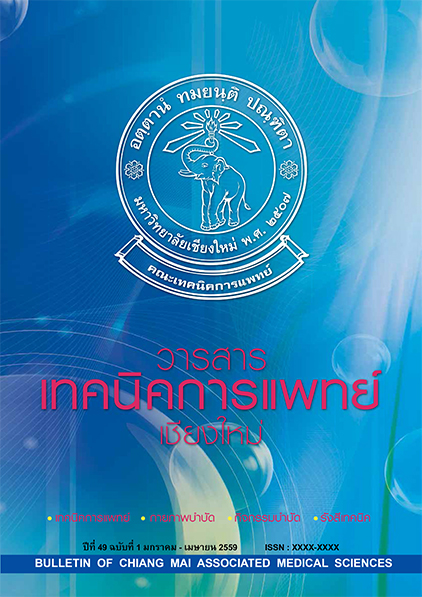Integration of occupational therapy and neuro-linguistic programming for Thais with mental health experiences
Main Article Content
Abstract
Background: A holistic psychosocial rehabilitation in Thailand remains nowhere and impacting on people with mental health experiences without ability for returning education or employment since they need program evaluation and management in Mental Health Recovery of Occupational Therapy (MHR-OT).
Objective: To compare the outcomes of MHR-OT (composed of OT, neuro-linguistic programming (NLP), and integrative NLP & OT in Thai clients with mental health experiences or diagnosed chronic psychosis.
Methods: Ten out of 50 clients were volunteering interested in attending MHR-OT program. They had been diagnosed bipolar, depression, eating phobia, or schizophrenia. There were two scales used before and after clients had participated in the 9-week program including cognitive levels of 0 (automatic action) to 6 (planned action) and self-efficacy scales of 1 (None) to 10 (Highest) for doing life activities with happiness. Descriptive and non-parametric statistics were used for data analysis.
Results: After completion of program, both scales were significantly increased. The single NLP improved cognitive ability, but not self-efficacy.
Conclusion: OT &NLP implementation indicates a useful tool for coaching, teaching, and learning for individual mental health experiences to be better improved levels of cognition and self-efficacy.
Bull Chiang Mai Assoc Med Sci 2016; 49(1): 10-16. Doi: 10.14456/jams.2016.14
Article Details
Personal views expressed by the contributors in their articles are not necessarily those of the Journal of Associated Medical Sciences, Faculty of Associated Medical Sciences, Chiang Mai University.
References
2. BandlerR,Grinder J. The structure of magic. Palo Alto (CA): Science and Behavior Books; 1975.
3. DiltsR, GrinderJ, BandlerR, DeLozier J. Neuro-linguistic programming: the study of the structure of subjective experience. California: Meta Publications; 1980.
4. Roderique-Davies G. Neuro-linguistic programming: cargo cult psychology? J Appl Res High Edu 2009; 1(2): 58-63.
5. Linder-Pelz S, Michael HL. The theoretical roots of NLP-based coaching. Coach Psycho 2007;3(1):12-7.
6. Carlos P, David WP. Creating rapport to influence: neuro linguistic programming techniques. Manage Serv 2015; 59(3): 20-4.
7. Skinner H, Croft R. Neuro-linguistic programming techniques to improve the self-efficacy of undergraduate dissertation students. J Appl Res High Edu 2009; 1(1): 29-38.
8. Stipancica M, Rennerb W, Schützc P, Donda, R. Effects of Neuro-Linguistic Psychotherapy on psychological difficulties and perceived quality of life. Couns Psychother Res 2010; 10(1): 39-49. doi: 10.1080/14733140903225240.
9. Sturt J, Ali S, Robertson W, Metcalfe D, Grove A, Bourne C, et al. Neurolinguistic programming: a systematic review of the effects on health outcomes. Br J Gen Pract 2012. doi: 10.3399/bjgp12X658287.
10. Witkowski T. Thirty-Five Years of Research on Neuro-Linguistic Programming. NLP Research Data Base. State of the Art or Pseudoscientific Decoration? Pol Psychol B 2011; 41(2): 58–66. doi: 10.2478/v10059-010-0008-0.
11. Karunaratne M. Neuro-linguistic programming and application in treatment of phobias. Comple Ther Clin Prac 2010; 16: 203-7.
12. Sawsaa AF, Lu J, Newman C, Ribchester H. Extracting occupational therapy concepts to develop domain ontology. Inter Con Dig Soc 2013; 65-73.
13. Jelinek H, Stocker R. Review of complex linguistic and neurobiological function in client outcomes: the relevance of communication in occupational therapy [Internet]. Internet J Rehabil 2012; 2(1) [cited 2015 Dec 19], Available from http://ispub.com/IJRE/2/1/13911.
14. KatzN. Cognitive rehabilitation: models for intervention in occupational therapy. Stoneham (MA): Butterworth-Heinemann; 1992.
15. Packer TL. Self-management concepts for enhancement of quality of life. Proceedings of the Faculty of Physical Therapy and Applied Movement Science Conference; Oct 1-2; Nakhon Pathom: Mahidol University; 2008.
16. Khemthong S, Saravitaya T. Knowledge translation of self-management concepts for Thais. J Nurs Sci 2012; 28(3): 8-12.
17. Wee B. Accelerated NLP Practitioner’s training manual. Singapore: Mind Transformations; 2014.
18. Petrovici MA. Effective methods of learning and teaching: a sensory approach. Procedia - SocBehSci 2013; 93: 146-50.
19. Grosu EF, Vlad TV, Carmen G, Preja A, Lulianad, BB. Neuro-linguistic programming based on the concept of modeling. Procedia – SocBehSci 2014; 116: 3693-9.
20. Sharif S, Rohaza E, Aziz A. Application of neuro-linguistic programming techniques to enhance the motivation of at-risk student. Inter E J Adv Educ 2015;I(1): 42-8. doi: http://dx.doi.org/10.18768/ijaedu.65269.
21. Williams DM. Outcome expectancy and self-efficacy: theoretical implications of an unresolved contradiction. Pers Soc Psychol Rev 2010; doi: 10.1177/1088868310368802.
22. Jongen PJ, Wesnes K, van Geel B, Pop P, Schrijver H, Leo H. Visser LH, et al. Does self-efficacy affect cognitive performance in persons with clinically isolated syndrome and early relapsing remitting multiple sclerosis? Mult Scler Inter 2015; http://dx.doi.org/10.1155/2015/960282.


